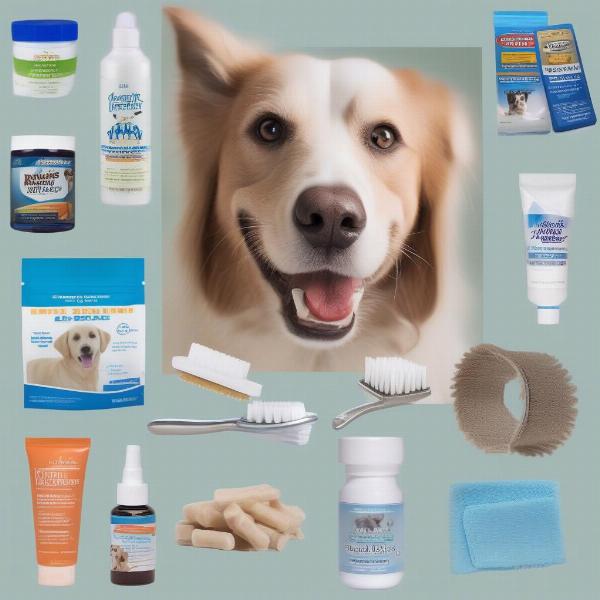Enzymatic toothpaste is a crucial part of maintaining your dog’s oral hygiene. It not only freshens breath but also helps prevent plaque and tartar buildup, leading to healthier gums and teeth. This article delves into the benefits of enzyme toothpaste for dogs, how to choose the right one, and how to effectively use it.
Why Choose Enzyme Toothpaste for Dogs?
Unlike human toothpaste, which often contains ingredients toxic to dogs like xylitol, enzyme toothpaste is specifically formulated for canine use. The key ingredient, enzymes, work by breaking down the proteins found in plaque and bacteria, preventing them from adhering to teeth and forming tartar. This proactive approach can significantly reduce the risk of periodontal disease, a common and painful condition in dogs. Regular brushing with enzyme toothpaste can also help freshen your dog’s breath, making those close-up cuddles even more enjoyable.
Selecting the Right Enzymatic Toothpaste
Choosing the right enzymatic toothpaste for your dog can seem daunting with so many options available. Look for a toothpaste approved by the Veterinary Oral Health Council (VOHC). This seal signifies that the product has undergone rigorous testing and proven effective in controlling plaque and tartar. Consider your dog’s size and breed when choosing a flavour. enzymatic dog toothpaste is a great starting point for researching options. Puppies and smaller dogs might prefer poultry or beef flavours, while larger breeds may enjoy mint or vanilla. Avoid toothpastes with artificial sweeteners or colours.
How to Brush Your Dog’s Teeth with Enzyme Toothpaste
Introducing tooth brushing should be a gradual process, especially for puppies. Start by letting your dog lick a small amount of the toothpaste from your finger to get used to the taste. Next, gently lift their lip and massage their gums with your finger. Gradually introduce a dog toothbrush, starting with short brushing sessions and gradually increasing the duration. logic dog toothpaste has a variety of brush options suited for different breeds. Aim to brush your dog’s teeth daily for optimal oral health.
Is Enzyme Toothpaste Enough?
While enzyme toothpaste is a vital part of dental care, it’s not a standalone solution. Regular veterinary checkups are essential for professional cleaning and identifying any potential dental issues early on. Consider supplementing brushing with dental chews and toys designed to promote chewing and help remove plaque. For dogs with existing tartar buildup, frugaria for tarter dogs may be a helpful addition to their dental routine.
What if My Dog Refuses Enzyme Toothpaste?
Some dogs might be resistant to tooth brushing. Try different flavours of enzyme toothpaste to find one your dog enjoys. You can also try using a finger brush or dental wipes as an alternative to a traditional toothbrush. Be patient and persistent, and reward your dog with praise and treats after each brushing session. Remember, maintaining your dog’s oral health is a crucial part of their overall well-being.
 Alternative Dog Dental Care Methods
Alternative Dog Dental Care Methods
Conclusion
Enzyme toothpaste plays a vital role in preventing dental disease and maintaining your dog’s overall health. By choosing the right toothpaste, using it correctly, and incorporating other dental care practices, you can ensure your furry friend enjoys a healthy, happy smile for years to come. Don’t forget to consult with your veterinarian about the best dental care plan for your dog, including the use of enzyme toothpaste.
FAQ
- What is the best enzyme toothpaste for dogs? The best toothpaste will be VOHC-approved and palatable to your dog. Consult your veterinarian for recommendations.
- How often should I brush my dog’s teeth with enzyme toothpaste? Ideally, you should brush your dog’s teeth daily.
- Can I use human toothpaste on my dog? No, human toothpaste contains ingredients that are toxic to dogs, such as xylitol.
- What are the signs of dental disease in dogs? Bad breath, red or swollen gums, difficulty chewing, and excessive drooling can be signs of dental problems.
- Are there any alternatives to enzyme toothpaste for dogs? Dental chews, toys, and wipes can be used in conjunction with, but not as a replacement for, enzyme toothpaste.
- Can puppies use enzyme toothpaste? Yes, you can start brushing your puppy’s teeth as soon as their teeth erupt.
- How much enzyme toothpaste should I use? A pea-sized amount is sufficient for most dogs.
ILM Dog is your trusted resource for all things canine, from breed selection and training to health, nutrition, grooming, and even travel advice. We are dedicated to providing reliable and practical information for dog owners worldwide, catering to all experience levels. For expert advice tailored to your needs, reach out to our team via email at [email protected] or call us at +44 20-3965-8624. ILM Dog empowers you to provide the best possible care for your furry companion. dog toothpaste uk offers a comprehensive guide for UK dog owners seeking information about toothpaste options. dog toothpaste nz offers resources tailored for New Zealand dog owners.